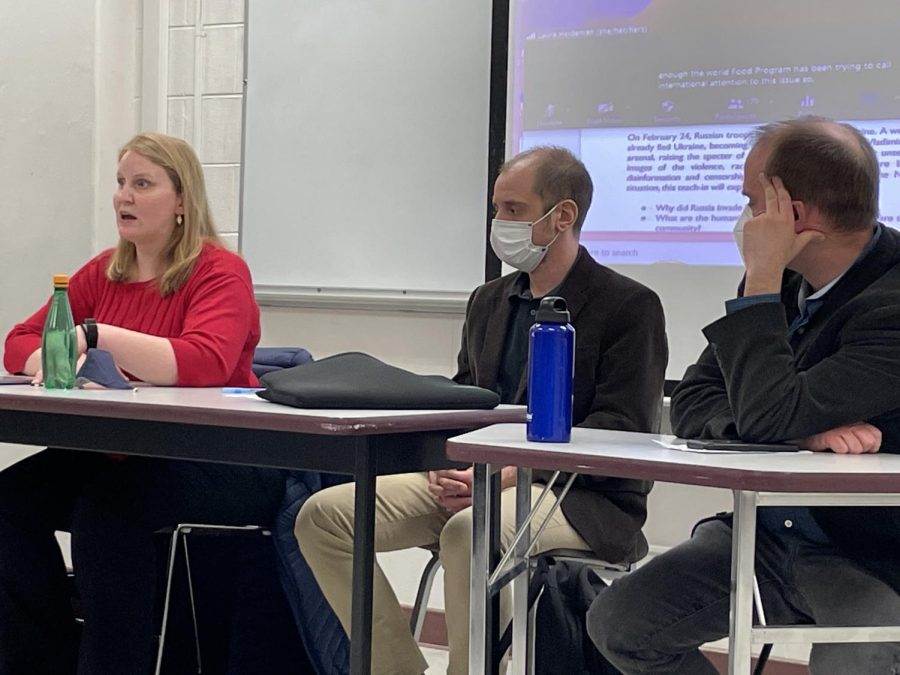Ukraine teach-in: ‘Putin had a plan’
Teach-in was held Tuesday to help people understand the war in Ukraine
From Left to right: Laura Heideman, Alex Sosenko and Andy Bruno were among the six faculty members who participated in Tuesday’s Teach-In about the War in Ukraine in 148 DuSable Hall
March 10, 2022
DeKALB – Over 60 students packed a classroom and 160 more gathered over Zoom to learn more about the ongoing war in Ukraine. A panel of six faculty members broke down various elements of the war, what led to it and what we can do about it as a nation and as individuals. The teach-in was held from 4:30 to 5:45 p.m. on Tuesday in 148 DuSable Hall.
“Your attendance speaks to how timely and relevant this is,” said Mark Schuller, a professor of anthropology at NIU and the moderator of the panel, to the attendees present.
The panel first started by addressing how the war began and who is to blame for it.
“I first want to unequivocally condemn Russia’s division of Ukraine,” said history professor Andy Bruno. “Russian censorship has blocked all mention of this as a war. But this is ultimately Putin’s war.”
Bruno was shocked by the invasion and didn’t think that it was going to happen in the way that it did. Bruno was doubtful of America’s intelligence reports given the history of America’s lying such as the existence of weapons of mass destruction in Iraq and a drone attack that killed 10 people last year.
“I went to Russia (in August and October) and it seemed normal,” Bruno said. “It became very clear that something bad was going to happen when Russia started to say genocide was going on in Ukraine.”
The discussion from all the panelists continued to place the blame on Russian President Vladamir Putin. Not only has the war been disastrous for Ukranians but Russians as well.
“The Ukrainians are suffering more,” Bruno said. “But Russians are losing their livelihoods and savings because of Putin’s war.”
The history of Ukraine was delved into including the development of the Ukrainian ethnic group and its constant history of fighting for independence including rebels fighting against both Nazi Germany and the U.S.S.R. during WWII. Ukraine’s history was discussed to refute Putin’s claims that Russians and Ukrainians are the same.
“In the 19th century, Russia began to push that Belarusians and Ukrainians are brothers,” said Joanna Kot, a professor in the Department of World Languages and Cultures. “There’s no basis for that.”
However, due to years of Russians believing this, “Putin’s words fall on fertile ground,” said Kot.
Sociology professor Laura Heideman, discussed the ongoing humanitarian crisis brewing in Ukraine with over 2 million refugees fleeing Ukraine, according to the United Nations High Commissioner for Refugees.
“This is the fastest refugee movement since WWII,” Heideman said.
This refugee crisis is contributing to the over 20 million refugees in the world today, including 6.7 million refugees from Syria.
“War is highly traumatic, war ruins lives,” Heideman said.
Heideman also made sure to let the attendees know how this war can affect the entire globe due to Ukraine producing a quarter of the world’s wheat and a significant part of the world’s corn crop. The places that will be hit hardest are low-income countries that depend on European imports.
“This humanitarian condition will lead to unrest in the rest of the world,” Heideman said.
Political science professor Ches Thurber talked about the strategy of Russia’s invasion and the motivations of Putin to invade and try to replace Ukraine’s government with a new regime. Thurber speculated that the invasion was done to make NATO seem weak. However, the response from the international community and the Ukrainian fighting forces was not what he expected.
“Putin probably thought he could get away with it,” Kot said.
Thurber also emphasized why the American people should care about the war.
“It challenges our core values of peace, democracy and human rights,” Thurber said.
Russia has increased propaganda and anti-Western views since the annexation of Crimea in 2014 to sway the mind of its people, said Anna Zapolska, a Ukrainian immigrant and doctoral candidate studying Russian media at NIU.
“I’ve been analyzing Russia for eight years,” Zapolska said. “Putin had a plan the whole time. We didn’t take this threat as seriously as we should.”
Zapolska also brought up how, despite economic sanctions from all of NATO against Russia, they can still get by through trading with China.
Alex Sosenko, a descendant of Ukrainian immigrants and a doctoral candidate at NIU, remarked on how this war is going to be traumatizing to everyone involved, especially the youth of both nations. He also explained why Ukraine has been fighting so hard against the Russians by pointing to its past of fighting against invaders.
“The idea of resistance is powerful to Ukraine,” Sosenko said. “Putin has given Ukrainian resistance the spotlight of history.”







